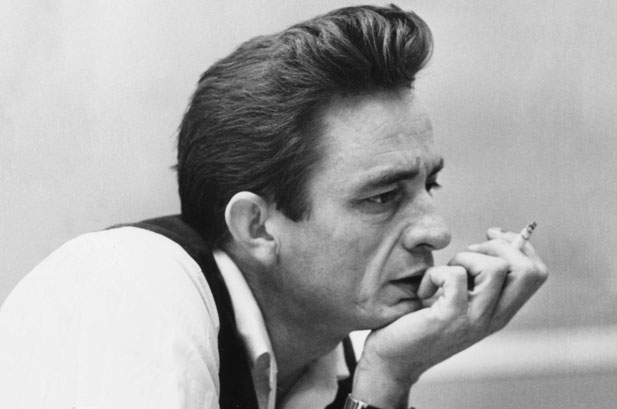Today marks 15 years since the death of country music legend Johnny Cash, who passed away on September 12th, 2003, at the age of 71.
The American star had been ill for some time with a degenerative disease similar to Parkinson's, but died in Nashville from complications arising from his diabetes. It was less than four months since the death of his beloved wife, June Carter Cash, leading many fans to believe the true cause of his rapid deterioration was a broken heart.
 The couple are buried next to each other near their home in Hendersonville, Tennessee. In life, Cash trod a chaotic and often self-destructive path which impacted on his health. Without his wife, who pulled him back from the brink, he would probably have died many years earlier.
The couple are buried next to each other near their home in Hendersonville, Tennessee. In life, Cash trod a chaotic and often self-destructive path which impacted on his health. Without his wife, who pulled him back from the brink, he would probably have died many years earlier.
Born in February 1932 in Kingsland, Arkansas, he was one of seven children whose parents, Ray and Carrie, were of mostly Scottish and English ancestry. In later life Cash traced his surname to 11th century Fife, where Cash Loch and other locations still bear the name.
At birth he was named simply J.R. Cash and it wasn’t until he enlisted in the US Air Force at the age of 19 that he changed his name to John R. Cash, as initials alone were not permitted. As a child he was very close to his older brother Jack, who was killed aged just 15 in an accident at the sawmill where he worked. The tragedy haunted Cash throughout his life and he often spoke of looking forward to seeing his brother Jack again in heaven.
Growing up in the Great Depression, Cash was put to work in the cotton fields on his family’s small farm when he was just five years old, singing along with his family as they worked. Heavily influenced by southern gospel music, he was taught the guitar by his mother and a childhood friend. He began writing and playing his own songs when he was just 12 and had a sweet tenor voice before it broke, eventually settling to his distinctive bass-baritone.
After basic training with the US Air Force, Cash served for three years in Germany as a Morse Code operator, intercepting Soviet Army transmissions during the early years of the Cold War. It was in Germany that he formed his first band, the Landsberg Barbarians. Just a month after his military discharge Cash married his first wife, Vivian Liberto, in San Antonio. They met just before he enlisted and their romance blossomed almost entirely via letters.
The couple, who would have four daughters together, settled in Memphis, Tennessee, where Cash made a living selling appliances while training to be a radio announcer and performing in a trio at night. Eventually Cash worked up the courage to audition for Sam Phillips at Sun Records in the hope of securing a recording contract.
His first audition, featuring gospel songs, was turned down by Phillips who said he no longer recorded such music, but a second audition, where Cash switched to his early rockabilly style, was successful. He recorded his first tracks – “Hey Porter” and “Cry! Cry! Cry!” – at Sun Records in 1955.
In December the following year Cash – by no using the name ‘Johnny’ – was at the studio while Carl Perkins was recording new material, backed on piano by Jerry Lee Lewis. When a young Elvis Presley dropped by, the four of them began an impromptu jam session of mainly gospel songs while Phillips left the tape recorder running. Stored away and largely forgotten, the tapes survived. It wasn't until many years later, when all four men were huge stars, that they were rediscovered and released as the “Million Dollar Quartet”, later spawning a stage musical of the same name.
Cash’s next record, “Folsom Prison Blues”, made the country top five and when “I Walk the Line” hit the number one spot he had truly arrived. Years of recording and touring followed, including Cash’s famous free concerts in prisons, which helped establish his ‘outlaw’ image. His liking for performing all in black – mainly because the clothes were easier to keep clean on long tours – also reinforced the image and saw him dubbed “The Man in Black”.
But Cash also began drinking heavily and relying on amphetamines and barbiturates to keep going, leading to divorce from his first wife in 1966. Cash had also become infatuated with June Carter, of country music’s famous Carter Family. They were finally married in 1968, some 13 years after they first met, and had a son, John Carter Cash, in 1970.
The couple would work and tour together for the next 35 years, right up to June’s death, but she fought a constant battle to keep him ‘on the rails’ and away from drugs and alcohol. As Cash’s own style evolved it spanned many musical genres, including rock ‘n’ roll, blues, folk and gospel, as well as country. This rare crossover appeal earned him the honour of being enrolled separately into the ‘Halls of Fame’ for Country, Rock ‘n’ Roll and Gospel Music.
Even in his final years and stricken with ill health, Cash’s popularity endured. His death sparked a huge resurgence of interest in his work, with several previously unreleased recordings becoming bestsellers after his passing. A feature film about his life with June Carter, “Walk the Line”, was also a huge hit when released in 2005.
